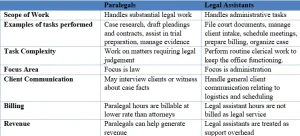Do you think law firms are only made up of only lawyers?
If yes, then you couldn’t be more wrong because law Offices like other types of businesses must address a wide variety of administrative, Professional and financial considerations to operate successfully. In a law firm, these tasks are generally handled by legal assistants, paralegals, and other staffers. Further, for larger firms, these tasks may be divided into specialized roles. However, for smaller firms, one or two individuals can be asked to handle a broad array of tasks.
Legal assistants and paralegals are among those people who are often charged with handling multiple support duties. In this article we will explore the similarities and differences between paralegals and legal assistants. We will talk about the necessary education and training required to get into these roles and also deal with the specific tasks each of them performs. But before getting into those details, first let us talk about why you should really worry about this distinction.
-
Why SMBs and Law Firms Should Worry About Distinction?

There are many areas of overlap between the tasks performed by paralegals and legal assistants, and they sometimes tend to get lumped together. However, there are several prominent differences between the expectations of a paralegal and a legal assistant, and understanding these differences is critical because: –
Cost and Efficiency: Law firms can save both time and money by assigning the right task to the right person. For example, law firms can hire paralegals at a lower rate than attorneys to handle many of the billable legal tasks. This helps reduce clients’ costs and free up the lawyer’s time for higher-value activities. Similarly, law firms can hire remote legal assistants to help keep daily operations running smoothly through clerical support, allowing lawyers to focus on core legal work.
Task Delegation: By knowing the differences in the skill sets and abilities, law firms can prevent attorneys from doing routine work or untrained legal assistants from handling legal matters. For example, legal assistants can cover tasks like scheduling, filing, and communication, while paralegals can handle substantive tasks under supervision. The perfect match of skills to duties enhances productivity and client service.
Role clarity: Small law firms can perform best by optimizing their limited staff. By clearly distinguishing the different roles, law firms can set expectations and also ensure compliance. Thus, hiring the right candidate for the right support role can be a strategic decision for every law firm.
Now that we are clear about the need to distinguish between legal assistants and paralegals, let’s start with the differences by Looking at the broader definition of these professions.
-
What is a Legal Assistant?
Legal assistants are also known as legal secretaries and are professionals responsible for offering legal and administrative support to law firms and lawyers. Legal assistants perform administrative and legal tasks like conducting legal research, managing filing systems, drafting legal documents, scheduling meetings and phone calls with clients, and assisting with trial preparation.
Legal assistants might sometimes coordinate with other professionals like court reporters and expert witnesses. But they are not licensed to practice law or offer legal advice. Legal assistants do not need to go to law school, and sometimes having a high school degree is enough. However, they are a vital cog in supporting lawyers and ensuring that the clients get the best representation.
-
What are the Roles and Responsibilities of a Legal Assistant?
In general, legal assistants perform administrative and organizational tasks that help keep a law office running smoothly. These tasks include setting up appointments, preparing documents, answering phone calls, keeping track of day-to-day considerations, and managing the calendar. A legal assistant therefore needs to be a detail-oriented person, and the perfect individual for this task should be able to handle multiple tasks at the same time.
So, we can easily say that the responsibilities of a legal assistant are quite broad, and individuals suited for these roles typically possess strong communication and organizational skills. While most of the work done by a legal assistant is in-house and they are not required to face the public, it is still essential that they are able to effectively handle inter-office communication and clearly communicate with clients and others in the field when necessary.
-
What is a Paralegal?
A paralegal often has a college degree and is a type of legal assistant who has received special education and training in legal practices and procedure. Paralegals are often required to hold a degree in paralegal studies or some related field and may also be certified by a professional organization. While some work that a paralegal does might seem similar to the tasks done by a legal assistant, but a paralegal in general has a much larger focus.
Paralegals focus on legal tasks life conducting legal research, drafting legal documents, interviewing witnesses or clients, organizing evidence, assisting with trial preparation, and case preparation. Paralegals, however, do not have the authorization to provide legal advice or represent clients in court. But they are an essential part of the legal team and helps ensure that the cases are prepared efficiently and effectively. Moreover, paralegals have higher credentials than legal assistants.
-
What are the Roles and Responsibilities of a Paralegal?
A paralegal is a non-lawyer legal professional with specialized training who performs substantial legal work under the supervision of an attorney. Moreover, paralegals handle delegated legal tasks requiring legal analysis and knowledge. Paralegals handle paperwork and research directly related to litigation. In order to do their tasks effectively, a paralegal should have a basic understanding of the litigation process and the relevant terminology.
Paralegals often handle massive research work, which, without them, would have to be handled by attorneys. They are also asked to draft notices related to discovery proceedings, organize evidence, prepare documents, and even interview clients or witnesses. However, paralegals do not have the license to practice law or offer legal advice to clients. As such, a paralegal cannot sign a pleading, take a deposition, or represent anyone in court.
Nonetheless, paralegals play a vital role in casework. Through their specialized skills, they help ensure that cases are handled efficiently and thoroughly under the oversight of the lawyer.
Now that we have a broad definition of the terms and work done by a paralegal and a legal assistant, let’s focus our attention on the key distinctions between the roles and responsibilities of paralegals and legal assistants.
-
What are the Distinctions Between the Roles and Responsibilities of Paralegals and Legal Assistants?
We have summarized the differences between the roles and responsibilities of paralegals and legal assistants in the form of a table below.

-
Whom Should You Hire Between Paralegals and Legal Assistants?

To decide between hiring paralegals and legal assistants, you need to first assess your tasks at hand. If most of the tasks you have involve legal research, case management, or drafting complex documents, then what your business needs is a paralegal. However, if the bulk of work at hand is not legal but administrative in nature, like scheduling, clerical work, or client communication, what your business needs is a legal assistant. Some businesses might need both professionals simultaneously: legal assistants for handling administrative tasks and paralegals for handling substantial legal work.
Budget considerations might also act as a deciding factor in whom a firm finally decides to hire. For instance, between paralegals and legal assistants, paralegals normally command a higher salary because of their education and the value of their billable work. However, the work done by a paralegal is also billable as billable hours. Legal assistants, in contrast, command a lower salary, and their work is not billable and is treated as support overhead.
Moreover, you can hire a remote legal assistant at a fraction of the local hiring cost by partnering with a remote staffing organization like Remote Resource®. Therefore, a small firm with a limited budget and needs might hire a legal assistant. However, a firm with heavy caseloads might find the higher cost of hiring a paralegal justified as it helps save attorney hours.
Whether you need to hire both also depends on the size of your firm. Solo ventures or very small firms often need versatile paralegals who can handle a range of tasks. In contrast, larger firms typically employ both paralegals and legal assistants. So, while deciding whether to hire one or the other, think about the future workload of your firm and whether you plan to expand your services. This will help you decide whether you need to hire paralegals for specialization or legal assistants for general administrative support.
Another factor that a firm must consider before choosing to hire either professional is compliance and risk. Any task involving legal judgment or filings should be done by the right qualified staff. For instance, it is important to remember that only a paralegal, and not a legal assistant, can prepare a brief draft for an attorney’s review. Misassigning these tasks could risk unauthorized practice issues.
Final Words
In the above pages, we have talked at length about the work done by paralegals and legal assistants and have also discussed whom your business should hire. To conclude, we can reiterate the importance of making the right hire for your business:
Efficiency: Although there might be an overlap in certain functions performed by paralegals and legal assistants, in general paralegals perform legal tasks whereas legal assistants take care of administrative and clerical work. When each person’s duty is correctly matched to their skills, the law firm can maximize productivity and reduce costs.
Avoid resource wastage: When you do not match a person’s skills with the tasks they are doing, you end up wasting resources. For example, if you hire a legal assistant to do tasks that need a paralegal, then the attorneys end up doing more and the bills go up. On the contrary, if you hire a paralegal to do tasks like data entry and scheduling, then you are underutilizing their capabilities.
Better Client Service– When you have paralegals to assist attorneys in legal tasks and legal assistants to take care of administrative and other clerical jobs, your attorneys are free to take care of your clients. This results in better client service and improved client satisfaction.
Small firms often face a dilemma while hiring resources due to budget constraints. This might force them to hire resources with limited skills or choose someone who is not suitable for the job. However, budget constraints should not be a worry for your business if you choose to hire remotely.
By partnering with a remote staffing organization like Remote Resource®, you can hire top-quality paralegals and legal assistants at a fraction of local hiring costs. Your Remote Resource® professional works as part of your team and is just a call away. Connect now to know more and get started with a one-week free trial.



